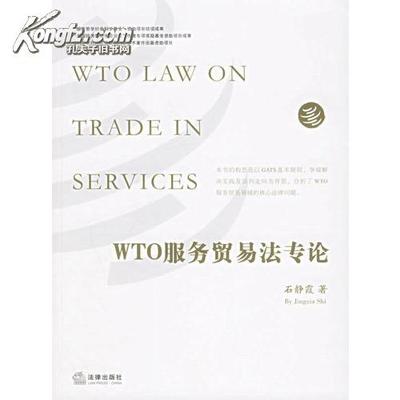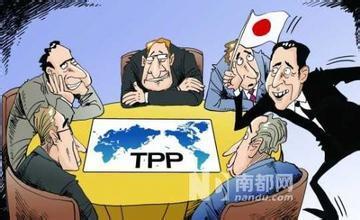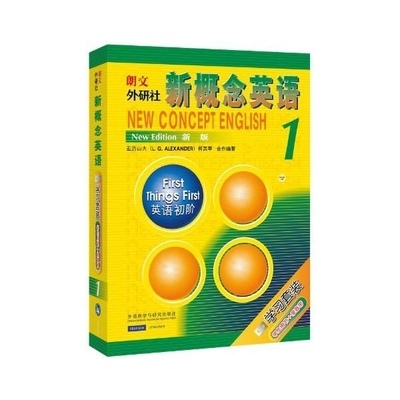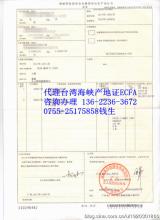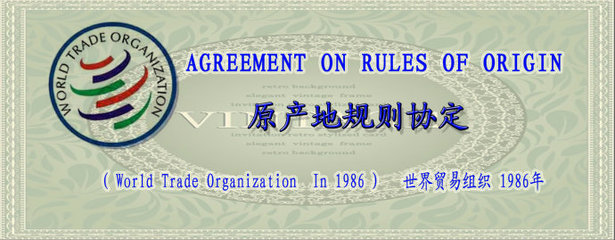
AGREEMENT ON RULES OF ORIGIN
原产地规则协定
( World Trade Organization In 1986 )世界贸易组织 1986年
Members, 缔约各方
Notingthat Ministers on 20 September 1986 agreed that the Uruguay Roundof Multilateral Trade Negotiations shall aim to "bring aboutfurther liberalization and expansion of world trade", "strengthenthe role of GATT" and "increase the responsiveness of the GATTsystem to the evolving international economicenvironment";
Desiringto further the objectives of GATT 1994;
Recognizing that clear and predictable rules of origin andtheir application facilitate the flow of internationaltrade;
Desiringto ensure that rules of origin themselves do not create unnecessaryobstacles to trade;
Desiringto ensure that rules of origin do not nullify or impair the rightsof Members under GATT 1994;
Recognizing that it is desirable to provide transparency oflaws, regulations, and practices regarding rules oforigin;
Desiringto ensure that rules of origin are prepared and applied in animpartial, transparent, predictable, consistent and neutralmanner;
Recognizing the availability of a consultation mechanismand procedures for the speedy, effective and equitable resolutionof disputes arising under this Agreement;
Desiringto harmonize and clarify rules of origin;
Hereby agree as follows:
注意到1986年9月20日部长会议同意、乌拉圭回合多边贸易谈判旨在使世界贸易进一步自由化和扩大化,强化关贸总协定的作用,并增加关贸总协定体系对发展变化中的国际经济环境的适应性;
意欲扩展关贸总协定的目标;
认为明确的、可预测的原产地规则及其实施,将便利国际贸易的流通;
切望确保原产地规则本身不对贸易造成不必要的障碍;
切望确保原产地规则不能取消或损害关贸总协定缔约方的权利;
认识到使有关原产地规则的法律、法规及惯例具有透明度是合乎需要的;
意欲确保原产地规则在一种公正、透明、可预见、一致和中立的气氛下达成并实施;
确认一个协商机制和程序的存在,它能够迅速、有效和公正地解决本协议下发生的争端;
切望调和并阐明原产地规则;
为此达成如下协议:
PARTIDEFINITIONS AND COVERAGE第一部分定义和范围
Article1Rules of Origin第一条原产地规则
1.For thepurposes of Parts I to IV of this Agreement, rules of origin shallbe defined as those laws, regulations and administrativedeterminations of general application applied by any Member todetermine the country of origin of goods provided such rules oforigin are not related to contractual or autonomous trade regimesleading to the granting of tariff preferences going beyond theapplication of paragraph 1 of Article I of GATT 1994.
1、按照本协议第一至第四部分的目的,原产地规则应该被定义为任何缔约国为确定货物原产地国家所实施的那些法律、法规及一般执行的行政决定,假如这样的原产地规则与导致给予关税优惠的缔约或自制贸易体无关(关贸总协定第1条第1款的实施除外)。
2.Rules oforigin referred to in paragraph 1 shall include all rules of originused in non-preferential commercial policy instruments, such as inthe application of: most-favoured-nation treatment under ArticlesI, II, III, XI and XIII of GATT 1994; anti-dumping andcountervailing duties under Article VI of GATT 1994; safeguardmeasures under Article XIX of GATT 1994; origin markingrequirements under Article IX of GATT 1994; and any discriminatoryquantitative restrictions or tariff quotas. They shall also includerules of origin used for government procurement and tradestatistics.
2、上述第1款中提到的原产地规则应包括所有用于非优惠贸易政策工具的原产地规则,例如关贸总协定第1、2、3、11、13条下的最惠国待遇;第6条下的反倾销和反贴补税;第19条下的保护措施;第9条下的原产国标记要求以及任何歧视性的数量限制或关税配额的实施。他们还应包括为政府采购和贸易统计而使用的原产地规则。
*“country”一词出现在本协议中时,意指每一缔约方的疆域。依此,欧共体在此协议中被认为是一个缔约方。
PARTIIDISCIPLINES TO GOVERN THE APPLICATION OF RULES OF ORIGIN
第二部分 原产地规则实施细则
Article2Disciplines During the Transition Period第二条过渡期间的规则
Until thework programme for the harmonization of rules of origin set out inPart IV is completed, Members shall ensure that:
(a)whenthey issue administrative determinations of general application,the requirements to be fulfilled are clearly defined. Inparticular:
(i)incases where the criterion of change of tariffclassification is applied, such a rule of origin, and anyexceptions to the rule, must clearly specify the subheadings orheadings within the tariff nomenclature that are addressed by therule;
(ii)incases where the ad valorem percentage criterion is applied, themethod for calculating this percentage shall also be indicated inthe rules of origin;
(iii)incases where the criterion of manufacturing or processing operationis prescribed, the operation that confers origin on the goodconcerned shall be precisely specified;
(b)notwithstanding the measure or instrument of commercialpolicy to which they are linked, their rules of origin are not usedas instruments to pursue trade objectives directly orindirectly;
(c)rulesof origin shall not themselves create restrictive, distorting, ordisruptive effects on international trade. They shall not poseunduly strict requirements or require the fulfilment of a certaincondition not related to manufacturing or processing, as aprerequisite for the determination of the country of origin.However, costs not directly related to manufacturing or processingmay be included for the purposes of the application of an advalorem percentage criterion consistent with subparagraph(a);
在完成下面第四部分所表述的原产地规则协调工作计划之前,各缔约方应确保:
(a)当各方发布一般实施的行政决定时,要清楚地明确有关要求,特别是:
——在实施税则分类变化标准的情况下,此原产地规则和原产地规则的任何例外,必须清楚地列出该规则所谈到的税则目录内的子税目或税目;
——在实施从价百分比标准的情况下,也应在原产地规则中列明计算这一百分比的方法;
——在实施制作标准或加工操作标准的情况下,必须明确地说明赋予有关产品原产地资格的操作标准;
(b)尽管贸易政策的措施或手段可能与原产地规则有联系,但各方不应将原产地规则作为直接或间接寻求贸易目标的工具;
(c)原产地规则自身不应对国际贸易产生限制性、歪曲性或破坏性的影响。原产地规则不应提出过分严格的要求或要求满足与制作或加工无关的某些条件来作为确定原产地国的先决条件。然而,为了实施上述(a)项所述的从价百分比标准,可以将与制作或加工无直接关系的费用包括进去;
(d)therules of origin that they apply to imports and exports are not morestringent than the rules of origin they apply to determine whetheror not a good is domestic and shall not discriminate between otherMembers, irrespective of the affiliation of the manufacturers ofthe good concerned ;
(e)theirrules of origin are administered in a consistent, uniform,impartial and reasonable manner;
(f)theirrules of origin are based on a positive standard. Rules of originthat state what does not confer origin (negative standard) arepermissible as part of a clarification of a positive standard or inindividual cases where a positive determination of origin is notnecessary;
(g)theirlaws, regulations, judicial decisions and administrative rulings ofgeneral application relating to rules of origin are published as ifthey were subject to, and in accordance with, the provisions ofparagraph 1 of Article X of GATT 1994;
(d)各方对进出口产品所实施的原产地规则,不应比他们所实施的确定产品是否是国产的那种原产地规则更为严格,亦不应歧视其他缔约方,有关产品的制造商的背景也不在考虑之列;
(e)应以连贯的、一致的、公正合理的方式管理其原产地规则;
(f)各方的原产地规则基于肯定标准之上。可允许原产地规则中规定哪些不能给予原产地确认(否定标准),以作为对肯定标准(说明的一部分)或一些不需要原产地肯定确认个例的说明的一部分;
(g)他们必须或按照总协定第10条的第1款,公布其原产地规则的实施有关的法律、法规及一般执行的司法和行政裁定;
(h)uponthe request of an exporter, importer or any person with ajustifiable cause, assessments of the origin they would accord to agood are issued as soon as possible but no later than 150 daysafter a request for such an assessment provided that all necessaryelements have been submitted. Requests for such assessments shallbe accepted before trade in the good concerned begins and may beaccepted at any later point in time. Such assessments shall remainvalid for three years provided that the facts and conditions,including the rules of origin, under which they have been maderemain comparable. Provided that the parties concerned are informedin advance, such assessments will no longer be valid when adecision contrary to the assessment is made in a review as referredto in subparagraph (j). Such assessments shall be made publicly available subject to theprovisions of subparagraph (k);
(i)whenintroducing changes to their rules of origin or new rules oforigin, they shall not apply such changes retroactively as definedin, and without prejudice to, their laws or regulations;
(j)anyadministrative action which they take in relation to thedetermination of origin is reviewable promptly by judicial,arbitral or administrative tribunals or procedures, independent ofthe authority issuing the determination, which can effect themodification or reversal of the determination;
(k)allinformation that is by nature confidential or that is provided on aconfidential basis for the purpose of the application of rules oforigin is treated as strictly confidential by the authoritiesconcerned, which shall not disclose it without the specificpermission of the person or government providing such information,except to the extent that it may be required to be disclosed in thecontext of judicial proceedings.
(h)应出口商、进口商或任何有正当理由的人要求,只要必要的材料已呈交,应尽快地在不迟于要求的150天内确认货物的原产地。接受这样的确认申请,可以在有关货物开始进行贸易之前,也可以在较晚的时候。只要事实、条件(包括做出这种确认的原产地规则)一直保持基本不变,则此确认可保持三年有效。只要有关方面被预先告知,在下述(i)项所指的审议中,当一裁定与此确认相矛盾时,则此确认将不再有效。按照下述(k)项的条款,应将这种确认公布于众;
(i)当各缔约方对其原产地规则或新的原产地规则进行改动时,这种改动不得违背其法律或法规,且须毫无偏见;
(j)各方对原产地的确认所采取的任何行政行为,可以迅速通过司法、仲裁或行政管理程序对其进行审议,而不受发布此确认的当局的支配;该确认会影响对原产地确认的修改或变更;
(k)所有自身属于机密的材料或为实施原产地原则而被秘密提供的材料,应被有关当局视为严格保密,未经材料提供人或政府的明确许可,有关当局不得披露材料内容;在如下范围内除外:在诉讼过程中,要求将材料公布于众。
Article 3Disciplines after the Transition Period 第三条 过渡期后的规则
Takinginto account the aim of all Members to achieve, as a result of theharmonization work programme set out in Part IV, the establishmentof harmonized rules of origin, Members shall ensure, upon theimplementation of the results of the harmonization work programme,that:
(a)theyapply rules of origin equally for all purposes as set out inArticle 1;
(b)undertheir rules of origin, the country to be determined as the originof a particular good is either the country where the good has beenwholly obtained or, when more than one country is concerned in theproduction of the good, the country where the last substantialtransformation has been carried out;
考虑到所有缔约方为达到下述第四部分所述的协调工作方案的目的,即协调原产地规则的确立,各缔约方一旦执行协调工作方案,应确保:
(a)他们应为上述第一条所述的各种目的,平等地实施原产地规则;
(b)依照原产地规则,某一特定产品的原产国,即是这一货物的完全生产国,或是当一个以上的国家参与了这一产品的生产时,那个对产品进行了最后的实质性加工的国家。
(c)therules of origin that they apply to imports and exports are not morestringent than the rules of origin they apply to determine whetheror not a good is domestic and shall not discriminate between otherMembers, irrespective of the affiliation of the manufacturers ofthe good concerned;
(d)therules of origin are administered in a consistent, uniform,impartial and reasonable manner;
(e)theirlaws, regulations, judicial decisions and administrative rulings ofgeneral application relating to rules of origin are published as ifthey were subject to, and in accordance with, the provisions ofparagraph 1 of Article X of GATT 1994;
(f)uponthe request of an exporter, importer or any person with ajustifiable cause, assessments of the origin they would accord to agood are issued as soon as possible but no later than 150 daysafter a request for such an assessment provided that all necessaryelements have been submitted. Requests for such assessments shallbe accepted before trade in the good concerned begins and may beaccepted at any later point in time. Such assessments shall remainvalid for three years provided that the facts and conditions,including the rules of origin, under which they have been maderemain comparable. Provided that the parties concerned are informedin advance, such assessments will no longer be valid when adecision contrary to the assessment is made in a review as referredto in subparagraph (h). Such assessments shall be made publiclyavailable subject to the provisions of subparagraph (i);
(c)各方对进出口产品所实施的原产地规则,不应比他们所实施的确定一项产品是否是国产的那种原产地规则更为严格,亦不应歧视其他缔约方,并不考虑有关产品的制造商的来厉;
(d)应以连贯一致和公正合理的方式管理其原产地规则;
(e)必须或按照总协定第10条第1款,公布其与原产地原则有关的法律、法规及一般执行的司法和行政裁定;
(f)应出口商、进口商或任何有正当理由的人的要求,只要必要的材料已呈交,应尽快地在不迟于要求的150天确认货物的原产地。接受这样的确认申请,可以在有关货物开始进行贸易之前,也可以在任何较晚的时候,只要事实、条件(包括做出这种确认的原产地规则)一直保持基本不变,则此确认三年有效。只要有关方面被预先告知,在下述(h)项所指的审议中,当一裁定与此确认相矛盾(有分歧)时,则此确认将不再有效。按照下述(i)项的条款,应将这种确认公布于众;
(g)whenintroducing changes to their rules of origin or new rules oforigin, they shall not apply such changes retroactively as definedin, and without prejudice to, their laws or regulations;
(h)anyadministrative action which they take in relation to thedetermination of origin is reviewable promptly by judicial,arbitral or administrative tribunals or procedures, independent ofthe authority issuing the determination, which can effect themodification or reversal of the determination;
(i)allinformation which is by nature confidential or which is provided ona confidential basis for the purpose of the application of rules oforigin is treated as strictly confidential by the authoritiesconcerned, which shall not disclose it without the specificpermission of the person or government providing such information,except to the extent that it may be required to be disclosed in thecontext of judicial proceedings.
(g)当各方对其原产地规则或新的原产地规则进行改动时,这种改动不得违背其法律或法规,且须毫无偏见;
(h)各方对原产地的确认所采取的任何行政行为,可以迅速通过司法、仲裁或行政管理或程序对其进行审议,不受发布此确认的当局支配,该确认会影响对原产地确认的修改或变更;
(i)所有自身属于机密的材料,或为实施原产地规则而被秘密提供的材料,应被有关当局视为严格保密,未经材料提供人或政府的明确许可,有关当局不得披露材料内容,在如下范围内除外:在司法诉讼过程中要求将材料公布于众。
PARTIIIPROCEDURAL ARRANGEMENTS ON NOTIFICATION, REVIEW,
CONSULTATION ANDDISPUTE SETTLEMENT
第三部分 通告、审议、磋商和解决争端的程序安排
Article 4Institutions第四条设立机构
1.There ishereby established a Committee on Rules of Origin (referred to inthis Agreement as "the Committee") composed of the representativesfrom each of the Members. The Committee shall elect its ownChairman and shall meet as necessary, but not less than once ayear, for the purpose of affording Members the opportunity toconsult on matters relating to the operation of Parts I, II, IIIand IV or the furtherance of the objectives set out in these Partsand to carry out such other responsibilities assigned to it underthis Agreement or by the Council for Trade in Goods. Whereappropriate, the Committee shall request information and advicefrom the Technical Committee referred to in paragraph 2 on mattersrelated to this Agreement. The Committee may also request suchother work from the Technical Committee as it considers appropriatefor the furtherance of the above-mentioned objectives of thisAgreement. The WTO Secretariat shall act as the secretariat to theCommittee.
所有机构须在下述协议下设立:
1、由各缔约方代表组成的原产地规则委员会(下文称委员会)。委员会将选出自己的主席,在必要时开会(但每年至少一次),以便为缔约方提供就该协议下第一、二、三和第四部分操作中的有关问题进行磋商的机会,或为促进这四部分所制订的目标的实现,并且承担由该协议或由缔约方赋予的其他义务提供机会。在适当的时候,委员会将从技术委员会(参下文第2款)索要资料并征询有关本协议的意见。委员会在认为适当的时候,还可向技术委员会询问其他工作以推动该协议上述目标的实现。GATT秘书处将作出委员会的秘书处行使职能。
2. Thereshall be established a Technical Committee on Rules of Origin(referred to in this Agreement as "the Technical Committee") underthe auspices of the Customs Co-operation Council (CCC) as set outin Annex I. The Technical Committee shall carry out the technicalwork called for in Part IV and prescribed in Annex I. Whereappropriate, the Technical Committee shall request information andadvice from the Committee on matters related to this Agreement. TheTechnical Committee may also request such other work from theCommittee as it considers appropriate for the furtherance of theabove-mentioned objectives of the Agreement. The CCC Secretariatshall act as the secretariat to the Technical Committee.
2、原产地规则技术委员会(下文称技术委员会)归属于本协议附件1所述的海关合作理事会。技术委员会将从事本协议第四部分所要求的以及附件1所规定的工作。在适当的时候,技术委员会可从委员会索要资料并征询有关本协议事务的意见。技术委员会,在认为适当的时候,还可向委员会询问其他工作以推动该协议上述目标的实现。海关合作理事会秘书处将作为技术委员会的秘书处行使职能。
Article 5Information and Procedures for Modification and Introduction of NewRules of Origin
第五条 修改和实施新的原产地规则的通告及程序
1.EachMember shall provide to the Secretariat, within 90 days after thedate of entry into force of the WTO Agreement for it, its rules oforigin, judicial decisions, and administrative rulings of generalapplication relating to rules of origin in effect on that date. Ifby inadvertence a rule of origin has not been provided, the Memberconcerned shall provide it immediately after this fact becomesknown. Lists of information received and available with theSecretariat shall be circulated to the Members by theSecretariat.
2.Duringthe period referred to in Article 2, Members introducingmodifications, other than de minimis modifications, to their rulesof origin or introducing new rules of origin, which, for thepurpose of this Article, shall include any rule of origin referredto in paragraph 1 and not provided to the Secretariat, shallpublish a notice to that effect at least 60 days before the entryinto force of the modified or new rule in such a manner as toenable interested parties to become acquainted with theintention to modify a rule of origin or to introduce a new rule oforigin, unless exceptional circumstances arise or threaten to arisefor a Member. In these exceptional cases, the Member shall publishthe modified or new rule as soon as possible.
本协议一旦生效,每一缔约方应在90天内,向秘书处提供其原产地规则、司法决定及自生效之日起所实施的有关原产地规则一般执行的行政管理规则。如果因疏漏,未及时提供原产地规则,有关缔约方应在知晓这一事实后立即提供。GATT秘书处应将所收到的和手中拥有的资料清单散发给各缔约方。
2、在上文第二条所述期间内(即过渡期内),缔约方若对其原产地规则做非细小更改,或者为本条所述目的,实施新的原产地规则(包括上述第1款中所指的任何原产地规则且未将其提供给秘书处),则应在改动后的或新实施的原产地规则生效前至少60天发布一通告,以便使有关各方了解其修改或实施一新原产地规则的意图;除非发生或有可能要发生例外情况。在例外情况下,缔约方应尽快发布所修改过的或新的规则。
Article 6Review第六条审议
1.TheCommittee shall review annually the implementation and operation ofParts II and III of this Agreement having regard to its objectives.The Committee shall annually inform the Council for Trade in Goodsof developments during the period covered by suchreviews.
2.TheCommittee shall review the provisions of Parts I, II and III andpropose amendments as necessary to reflect the results of theharmonization work programme.
3.TheCommittee, in cooperation with the Technical Committee, shall setup a mechanism to consider and propose amendments to the results ofthe harmonization work programme, taking into account theobjectives and principles set out in Article 9. This may includeinstances where the rules need to be made more operational or needto be updated to take into account new production processes asaffected by any technological change.
1、委员会针对本协议的目的性,将每年审议本协议第二、三部分的执行和运作情况,并且每年将审议期间的进展情况通告各缔约方。
2、委员会应审议上述第一、二、三部分的条款,并在必要时,提供修改(建议)以反映协调工作方案的成果。
3、考虑到第九条所列的目标和原则,委员会将配合技术委员会,建立一机制来考虑和提出修改协调工作方案结果。这可以包括需使该规则更易操作的情况,或需要更新规则以适应受技术变化影响的新的生产加工过程。
Article 7Consultation第七条磋商
Theprovisions of Article XXII of GATT 1994, as elaborated and appliedby the Dispute Settlement Understanding, are applicable to thisAgreement.
解决争端谈判小组业已改进并做了详细说明的关贸总协定第22条中的条款。适用于本协议。
Article 8Dispute Settlement第八条争端的解决
Theprovisions of Article XXIII of GATT 1994, as elaborated and appliedby the Dispute Settlement Understanding, are applicable to thisAgreement.
解决争端谈判小组业已改进并做了详细说明的关贸总协定第23条中的条款。适用于本协议。
PART IVHARMONIZATION OF RULES OF ORIGIN第四部分原产地规则的协调
Article 9Objectives and Principles第九条1、目标和原则
1.With theobjectives of harmonizing rules of origin and, inter alia,providing more certainty in the conduct of world trade, theMinisterial Conference shall undertake the work programme set outbelow in conjunction with the CCC, on the basis of the followingprinciples:
(a)rulesof origin should be applied equally for all purposes as set out inArticle 1;
(b)rulesof origin should provide for the country to be determined as theorigin of a particular good to be either the country where the goodhas been wholly obtained or, when more than one country isconcerned in the production of the good, the country where the lastsubstantial transformation has been carried out;
(c)rulesof origin should be objective, understandable andpredictable;
(d)notwithstanding the measure or instrument to which they may belinked, rules of origin should not be used as instruments to pursuetrade objectives directly or indirectly. They should not themselvescreate restrictive, distorting or disruptive effects oninternational trade. They should not pose unduly strictrequirements or require the fulfilment of a certain condition notrelating to manufacturing or processing as a prerequisite for thedetermination of the country of origin. However, costs not directlyrelated to manufacturing or processing may be included for purposesof the application of an ad valorem percentagecriterion;
(e)rulesof origin should be administrable in a consistent, uniform,impartial and reasonable manner;
(f)rulesof origin should be coherent;
(g)rulesof origin should be based on a positive standard. Negativestandards may be used to clarify a positive standard.
为了协调原产地规则,特别是为了给世界贸易活动提供更大的可靠性,缔约各方应与海关合作理事会一起,基于如下原则,从事下述的工作计划:
(a)按照上述第一条所列的各种目的,应平等地实施原产地规则;
(b)依照原产地原则的规定,某一特定产品的原产国即是这一产品的完全生产国,或者是当一个以上的国家参与了这一产品的生产时,那个对产品进行了最后的实质性加工的国家。
(c)原产地规则应具有客观性、易于理解,并具有可预见性;
(d)尽管可能与措施或手段发生联系,但原产地规则不得被当作直接或间接寻求贸易目标的工具。原产地规则自身不应对国际贸易产生限制性、歪曲性或破坏性的影响。他们不应提出过分严格的要求或要求满足与制作或加工无关的某些条件来作为确定原产地国的先决条件。然而,为了实施从价百分比标准,可以将与制作或加工无直接关系的费用包括进去;
(e)应以连贯的、一致的、公正合理的方式管理原产地规则;
(f)原产地规则应紧凑连贯;
(g)原产地规则应以肯定标准为基础。否定标准可被用来阐明肯定标准。
2. WorkProgramme 2、工作(方案)计划
(a)The work programmeshall be initiated as soon after the entry into force of the WTOAgreement as possible and will be completed within three years ofinitiation.
(b)TheCommittee and the Technical Committee provided for in Article 4shall be the appropriate bodies to conduct this work.
(c)Toprovide for detailed input by the CCC, the Committee shall requestthe Technical Committee to provide its interpretations and opinionsresulting from the work described below on the basis of theprinciples listed in paragraph 1. To ensure timely completion ofthe work programme for harmonization, such work shall be conductedon a product sector basis, as represented by various chapters orsections of the Harmonized System (HS) nomenclature.
(a)工作计划应在乌拉圭回合后,尽快开始(实施),且应在开始后三年内完成。
(b)本协议第四条所述的委员会和技术委员会是从事这项工作的合适机构。
(c)由海关合作理事会提供详尽的数据,委员会应要求技术委员会提供其基于本条第1款所列原则,对下述工作的解释和意见,为确保及时完成协调工作计划,此项工作应在协调制度税则目录各章节所列的一产品区基础上进行。
(i)WhollyObtained and Minimal Operations or Processes
TheTechnical Committee shall develop harmonized definitionsof:
-the goodsthat are to be considered as being wholly obtained in one country.This work shall be as detailed as possible;
-minimaloperations or processes that do not by themselves confer origin toa good.
Theresults of this work shall be submitted to the Committee withinthree months of receipt of the request from theCommittee.
(ii)Substantial Transformation - Change in TariffClassification
-TheTechnical Committee shall consider and elaborate upon, on the basisof the criterion of substantial transformation, the use of changein tariff subheading or heading when developing rules of origin forparticular products or a product sector and, if appropriate, theminimum change within the nomenclature that meets thiscriterion.
-TheTechnical Committee shall divide the above work on a product basistaking into account the chapters or sections of the HSnomenclature, so as to submit results of its work to the Committeeat least on a quarterly basis. The Technical Committee shallcomplete the above work within one year and three months fromreceipt of the request of the Committee.
(i)完全获得和最微小操作或加工技术委员会应对此做出协调定义:
—被认为是在一国完全获得的货物。该工作应尽可能详尽;
—本身不赋予货物原产地资格的最微小操作或加工。
在接到委员会要求的三个月内,应将这项工作的结果递交委员会。
(ii)实质性改变——税则分类变化
—技术委员会应在实质性改变标准的基础上,在制定针对特定产品或一产品区的原产地规则时,考虑和详细阐明,如何使用税则子目或目录变化,和适当时,符合改变标准的目录内的最小变化。
—技术委员会考虑到协调制章节,应以产品为基础,划分上述工作,以便至少每季度向委员会递交其工作结果。技术委员会应在收到委员会要求的一年零三个月内完成上述工作。
(iii)Substantial Transformation - Supplementary Criteria
Uponcompletion of the work under subparagraph (ii) for each productsector or individual product category where the exclusive use ofthe HS nomenclature does not allow for the expression ofsubstantial transformation, the Technical Committee:
-shallconsider and elaborate upon, on the basis of the criterion ofsubstantial transformation, the use, in a supplementary orexclusive manner, of other requirements, including ad valorempercentages and/or manufacturing or processing operations , whendeveloping rules of origin for particular products or a productsector;
-mayprovide explanations for its proposals;
-shalldivide the above work on a product basis taking into account thechapters or sections of the HS nomenclature, so as to submitresults of its work to the Committee at least on a quarterly basis.The Technical Committee shall complete the above work within twoyears and three months of receipt of the request from theCommittee.
(iii)实质性改变——补充标准
一旦完成(ii)款项下每一产品区或单一产品分类的工作(在该分类中,不允许例外使用HS目录表述实质性改变),技术委员会;
—应在对特定产品或一产品区特定原产地规则时,以补充或例外方式考虑和详细阐述,如何利用其它要求,包括从价百分比和(或)当为某些特定产品或一个产品区制订原产地规则时,生产和加工的操作过程。
—可以提供对其建议的解释;
—考虑到协调制的章节,应以一产品为基础,划分上述工作,以便至少每季度向委员会递交其工作结果报告。技术委员会应在收到委员会要求的两年零三个月内完成上述工作。
3. Role ofthe Committee On the basis of the principles listed in paragraph 1:
3、GATT的作用 在本条第1款所述原则的基础上:
(a)theCommittee shall consider the interpretations and opinions of theTechnical Committee periodically in accordance with the time-framesprovided in subparagraphs (i), (ii) and (iii) of paragraph 2(c)with a view to endorsing such interpretations and opinions. TheCommittee may request the Technical Committee to refine orelaborate its work and/or to develop new approaches. To assist theTechnical Committee, the Committee should provide its reasons forrequests for additional work and, as appropriate, suggestalternative approaches;
(b)uponcompletion of all the work identified in subparagraphs (i), (ii)and (iii) of paragraph 2(c), the Committee shall consider theresults in terms of their overall coherence.
Results ofthe Harmonization Work Programme and Subsequent Work
技术委员会应按照上述(i)、(ii)和(iii)项所规定的时间框架,定期考虑技术委员会的解释和意见,以认可此解释和意见。委员会可以要求技术委员会使工作精益求精,详细阐述其工作或提出新措施。为协助技术委员会,委员会应在适当时,提出要求增加工作的理由和建议供其选择的方法;
一旦完成上述(i)、(ii)和(iii)项所明确的全部工作,委员会将从全面一致性角度考虑结果。
4.TheMinisterial Conference shall establish the results of theharmonization work programme in an annex as an integral part ofthis Agreement. The Ministerial Conference shall establish atime-frame for the entry into force of this annex.
4、协调工作方案结果和随后工作
缔约方应在附件中列明协调工作方案结果,以作为本协议一个不可或缺的组成部分。缔约方应对本附件的生效期规定一个时间框架。
ANNEX ITECHNICAL COMMITTEE ON RULES OF ORIGIN
附件1 原产地规则技术委员会
Responsibilities
1.Theongoing responsibilities of the Technical Committee shall includethe following:
(a)at therequest of any member of the Technical Committee, to examinespecific technical problems arising in the day-to-dayadministration of the rules of origin of Members and to giveadvisory opinions on appropriate solutions based upon the factspresented;
(b)tofurnish information and advice on any matters concerning the origindetermination of goods as may be requested by any Member or theCommittee;
(c)toprepare and circulate periodic reports on the technical aspects ofthe operation and status of this Agreement; and
(d)toreview annually the technical aspects of the implementation andoperation of Parts II and III.
1、技术委员会承担的不断增加的责任应包括如下四款:
(a)应技术委员会任一成员的要求,审查缔约国在日常管理原产地规则中出现的特定技术问题,并在所提供事实的基础上,就恰当的解决方法提供指导意见。
(b)对任何缔约方或委员会可能要求确认产品原产地的任何事宜,提供讯息和建议;
(c)就本协议操作和地位的技术方面情况,拟定和公布定期报告;
(d)对本协议第二、三部分的执行操作进行年度审议。
2.TheTechnical Committee shall exercise such other responsibilities asthe Committee may request of it.
3.TheTechnical Committee shall attempt to conclude its work on specificmatters, especially those referred to it by Members or theCommittee, in a reasonably short period of time.
Representation
4.EachMember shall have the right to be represented on the TechnicalCommittee. Each Member may nominate one delegate and one or morealternates to be its representatives on the Technical Committee.Such a Member so represented on the Technical Committee ishereinafter referred to as a "member" of the Technical Committee.Representatives of members of the Technical Committee may beassisted by advisers at meetings of the Technical Committee. TheWTO Secretariat may also attend such meetings with observerstatus.
2、技术委员会应按照委员会可能提出的要求,履行其它这方面的责任。
3、技术委员会应在合理的短时间内,努力结束其具体事务,尤其是那些由缔约方或委员会委托的工作。
代表
4、每一缔约方都有权利作为技术委员会的代表。每一缔约方可以提名一个代表和一个或多个候补者作为其技术委员会的代表,作为技术委员会代表的缔约国方即可作为技术委员会一个成员。技术委员会成员的代表能够在技委会的会议上得到顾问的协助。GATT秘书处亦可以观察员身份出席此类会议。
5.Membersof the CCC which are not Members of the WTO may be represented atmeetings of the Technical Committee by one delegate and one or morealternates. Such representatives shall attend meetings of theTechnical Committee as observers.
6.Subjectto the approval of the Chairman of the Technical Committee, theSecretary-General of the CCC (referred to in this Annex as "theSecretary-General") may invite representatives of governments whichare neither Members of the WTO nor members of the CCC andrepresentatives of international governmental and tradeorganizations to attend meetings of the Technical Committee asobservers.
7.Nominations of delegates, alternates and advisers tomeetings of the Technical Committee shall be made to theSecretary-General.
Meetings
8.TheTechnical Committee shall meet as necessary, but not less than oncea year.
Procedures
9.TheTechnical Committee shall elect its own Chairman and shallestablish its own procedures.
5、属非缔约方的海关合作理事会成员可以由一代表或多个候补者出席技术委员会会议,这些代表应作为观察员出席技术委员会会议。
6、须经技术委员会主席的同意,海关合作理事会秘书长(以下称秘书长)可以邀请既不是缔约方又不是海关合作理事会成员的政府代表和国际组织代表及国际贸易组织的代表作为观察员参加技术委员会会议。
7、应向秘书长做出对技术委员会会议的代表、候补代表和顾问的提名。
会议
8、技术委员会在必要时开会,但至少一年一次。
程序
9、技术委员会应选举自己的主席并设定自己的程序。
ANNEX IICOMMON DECLARATION WITH REGARD TO PREFERENTIAL RULES OFORIGIN
附件2 关于优惠原产地规则的共同宣言
1.Recognizing that some Members apply preferential rules oforigin, distinct from non-preferential rules of origin, the Membershereby agree as follows.
2.For thepurposes of this Common Declaration, preferential rules of originshall be defined as those laws, regulations and administrativedeterminations of general application applied by any Member todetermine whether goods qualify for preferential treatment undercontractual or autonomous trade regimes leading to the granting oftariff preferences going beyond the application of paragraph 1 ofArticle I of GATT 1994.
1、认识到一些缔约国实施与非优惠,原产地规则截然不同的优惠原产地规则,各缔约方为此达成如下协议。
2、为了该共同宣言的目的,优惠原产地规则应被定义为任一缔约方为确认货物能否享受实施关税优惠的缔约或自治贸易体给予的优惠待遇(不受关贸总协定第1条第1款所限),所实施的那些法律、法规及一般执行的行政决定。
3.TheMembers agree to ensure that: 3、缔约方同意确保:
(a)whenthey issue administrative determinations of general application,the requirements to be fulfilled are clearly defined. Inparticular:
(i)incases where the criterion of change of tariff classification isapplied, such a preferential rule of origin, and any exceptions tothe rule, must clearly specify the subheadings or headings withinthe tariff nomenclature that are addressed by the rule;
(ii)incases where the ad valorem percentage criterion is applied, themethod for calculating this percentage shall also be indicated inthe preferential rules of origin;
(iii)incases where the criterion of manufacturing or processing operationis prescribed, the operation that confers preferential origin shallbe precisely specified;
(b)theirpreferential rules of origin are based on a positive standard.Preferential rules of origin that state what does not conferpreferential origin (negative standard) are permissible as part ofa clarification of a positive standard or in individual cases wherea positive determination of preferential origin is notnecessary;
(c)theirlaws, regulations, judicial decisions and administrative rulings ofgeneral application relating to preferential rules of origin arepublished as if they were subject to, and in accordance with, theprovisions of paragraph 1 of Article X of GATT 1994;
(a)当他们发布一般实施的行政法规时,要清楚地明确有关要求,特别是:
——在实施税则分类变化标准的情况下,此优惠原产地规则及这一规则的任何例外,必须明确指明本规则所谈到的税则目录内的子税目或税目。
——在实施从价百分比标准的情况下,也应在优惠原产地规则中列明计算这一百分比的方法;
——在实施制作标准或加工操作标准的情况下,必须明确地规定赋予产品优惠原产地资格的操作规程:
(b)其优惠原产地规则基于肯定标准之上。可允许优惠原产地规则中规定哪些不能给予优惠原产地资格(否定标准),以作为对肯定标准或一些不需要优惠原产地肯定确认这种个例的说明的一部分;
(c)他们必须或按照总协定第10条第1款,公布其与优惠原产地规则有关的法律、法规及一般执行的司法和行政裁定:
(d)uponrequest of an exporter, importer or any person with a justifiablecause, assessments of the preferential origin they would accord toa good are issued as soon as possible but no later than 150 daysafter a request for such an assessment provided that all necessaryelements have been submitted. Requests for such assessments shallbe accepted before trade in the good concerned begins and may beaccepted at any later point in time. Such assessments shall remainvalid for three years provided that the facts and conditions,including the preferential rules of origin, under which they havebeen made remain comparable. Provided that the parties concernedare informed in advance, such assessments will no longer be validwhen a decision contrary to the assessment is made in a review asreferred to in subparagraph (f). Such assessments shall be madepublicly available subject to the provisions of subparagraph(g);
(e)whenintroducing changes to their preferential rules of origin or newpreferential rules of origin, they shall not apply such changesretroactively as defined in, and without prejudice to, their lawsor regulations;
(f)anyadministrative action which they take in relation to thedetermination of preferential origin is reviewable promptly byjudicial, arbitral or administrative tribunals or procedures,independent of the authority issuing the determination, which caneffect the modification or reversal of thedetermination;
(g)allinformation that is by nature confidential or that is provided on aconfidential basis for the purpose of the application ofpreferential rules of origin is treated as strictly confidential bythe authorities concerned, which shall not disclose it without thespecific permission of the person or government providing suchinformation, except to the extent that it may be required to bedisclosed in the context of judicial proceedings.
(d)应出口商,进口商或任何有正当理由的人的要求,只要必要的材料已呈交,应尽快地在不迟于要求的150天内发布对货物优惠原产地的确认。接受这样的确认申请,可以在有关货物开始进行贸易之前,也可以在任何较晚的时候。只要事实条件(包括做出这种确认的优惠原产地规则)一直保持基本不变,则此确认可保持三年有效。只要有关方面被预先告知,在下述(f)项所指的审议中,当一裁定与此确认相矛盾时,则此确认将不再有效。按照下述(g)项的条款,应将这种确认公布于众;
(e)当各方对其优惠原产地规则或新的优惠原产地规则进行改动时,这种改动不得违背其法律或法规,且须无偏见;
(f)各方对优惠原产地的确认所采取的任何行政行为,可以迅速通过司法、仲裁或行政管理程序对其进行审议,但不受发布此确认的当局的支配;此审议会影响对优惠原产地确认的修改或变更;
(g)所有自身属于机密的材料,或为实施优惠原产地规则而被秘密提供的材料,应被有关当局视为严格保密,未经材料提供人或政府的明确许可,有关当局不得披露材料内容;在如下范围内除外;在司法诉讼过程中,可要求将材料公布于众。
4.Membersagree to provide to the Secretariat promptly their preferentialrules of origin, including a listing of the preferentialarrangements to which they apply, judicial decisions, andadministrative rulings of general application relating to theirpreferential rules of origin in effect on the date of entry intoforce of the WTO Agreement for the Member concerned. Furthermore,Members agree to provide any modifications to their preferentialrules of origin or new preferential rules of origin as soon aspossible to the Secretariat. Lists of information received andavailable with the Secretariat shall be circulated to the Membersby the Secretariat.
4、各缔约方同意向秘书处迅速提供其优惠原产地规则,包括他们所实施的优惠安排清单、司法决定和与共同宣言同日生效的优惠原产地规则有关的、一般执行的行政管理细则。各缔约方并且同意尽快向GATT秘书处提供其优惠原产地规则的变动情况或新的优惠原产地规则。秘书处应将所收到的和所拥有的资料清单散发给各缔约方。
 爱华网
爱华网